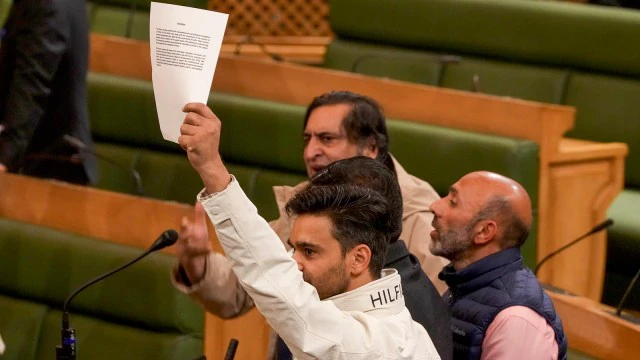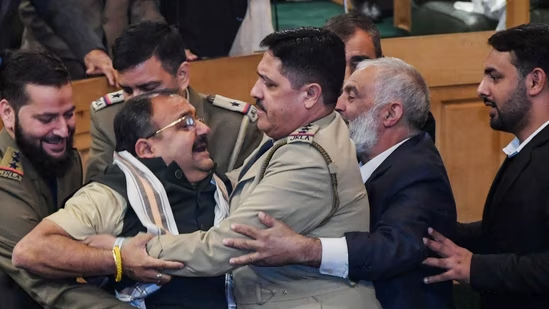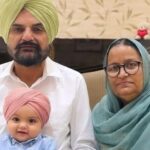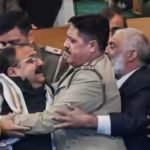
A day after the Jammu and Kashmir Assembly passed a resolution seeking dialogue on restoring the region’s special status, five non-BJP Opposition MLAs have submitted their own counter-resolution. Led by prominent figures such as Sajad Lone of the People’s Conference and Waheed Para of the Peoples Democratic Party (PDP), the legislators strongly rejected the Omar Abdullah-led government’s stance, calling for the immediate and complete reinstatement of Jammu and Kashmir’s special constitutional provisions, specifically Articles 370 and 35A.
Opposition MLAs Reject Omar Abdullah’s Stance on Article 370 Abrogation
In their resolution, submitted to Assembly Speaker Abdul Rahim Rather, the five MLAs criticized the “unconstitutional and unilateral” abrogation of Article 370 and Article 35A by the Indian government on August 5, 2019. The abrogation, along with the enactment of the Jammu & Kashmir Reorganisation Act, 2019, stripped the region of its special status and downgraded it from a state to two Union Territories.
The resolution submitted by the MLAs condemned these actions as a violation of the constitutional guarantees originally accorded to the people of Jammu and Kashmir. The statement read: “This House strongly condemns the unconstitutional and unilateral abrogation of Article 370 and Article 35A, along with the enactment of the Jammu & Kashmir Reorganisation Act, 2019. These actions stripped Jammu & Kashmir of its special status and statehood, undermining the foundational guarantees and protections originally accorded to the region and its people by the Constitution of India.”
The People’s Resolution also demanded that Articles 370 and 35A be restored in their original form, and that all changes made under the Reorganisation Act be reversed. The MLAs emphasized the need for the Indian government to respect the constitutional and democratic sanctity of Jammu and Kashmir by reinstating the region’s distinct identity, political autonomy, and cultural integrity.
Opposition Criticizes National Conference’s “Weak” Resolution
The MLAs’ resolution was seen as a direct rebuke to the National Conference (NC), which had brought forward its own resolution a day earlier, seeking dialogue on the restoration of J&K’s special status. However, the NC’s resolution was criticized by the five Opposition legislators for being too weak and failing to fully address the people’s demands.
Speaking to the press after submitting the People’s Resolution, Sajad Lone, a key Opposition figure, criticized the NC for what he described as a betrayal of the people of Jammu and Kashmir. “We don’t want to criticize unnecessarily. We supported them (NC) when they brought the resolution on Wednesday, but it was a weak resolution… It is a humiliation and betrayal of the people of Jammu and Kashmir,” said Lone.
He added that the NC’s resolution was a mere “medley of words” that did not go far enough in addressing the unconstitutional abrogation of Articles 370 and 35A. He urged the NC to either support the People’s Resolution or bring forward a stronger resolution of their own, stating that if they did so, he would apologize for his remarks. “But if they don’t support this resolution, I will call it a fixed match,” Lone added, accusing the NC of stalling his group’s resolution in collaboration with the BJP.
BJP-NC “Fixed Match” Allegation
The assembly proceedings were disrupted shortly after the submission of the People’s Resolution, with members of both the BJP and NC trading slogans and counter-slogans. Lone accused the NC and BJP of coordinating to prevent the People’s Resolution from being discussed, calling it a “fixed match” between the two parties.
“First, the BJP shouts, and when they stop, the NC starts shouting,” Lone said, suggesting that the NC was deliberately stalling the debate on the People’s Resolution in collusion with the BJP. He further challenged the NC to explain the difference between their resolution and the People’s Resolution, and to support the latter if they genuinely represented the will of the people.
Waheed Para and the PDP Criticize NC’s Historical Role
Waheed Para of the PDP, who had submitted his own resolution seeking special status for J&K earlier in the week, echoed Lone’s criticism of the NC. Para accused the NC of historically aligning with the Centre whenever the powers of Jammu and Kashmir were curtailed. “From 1947 till now, whenever the Centre has snatched our powers, whether it was special status or downgrading the Prime Minister (Wazir-e-Azam) to Chief Minister, the NC has done it for them,” Para said.
He expressed disappointment that the NC’s resolution on Wednesday prioritized statehood over the restoration of Article 370, arguing that this was not in line with the will of the people. “They said that the first business of the House would be a resolution on 370, but they brought a resolution on statehood. That was not the will of the people,” Para stated.
Conclusion
The People’s Resolution marks a significant development in the ongoing political debate over the future of Jammu and Kashmir. While the Omar Abdullah-led government seeks a more cautious approach, calling for dialogue on special status, the five Opposition MLAs are pushing for immediate and complete restoration of Articles 370 and 35A. As political tensions rise, the challenge for the NC and other parties is whether to support this new resolution or continue with their more moderate stance.
The political landscape in Jammu and Kashmir remains deeply divided, with the fate of its special status and autonomy still uncertain. As opposition leaders continue to call for stronger action, the Indian government’s response to these demands will likely shape the region’s political future.










